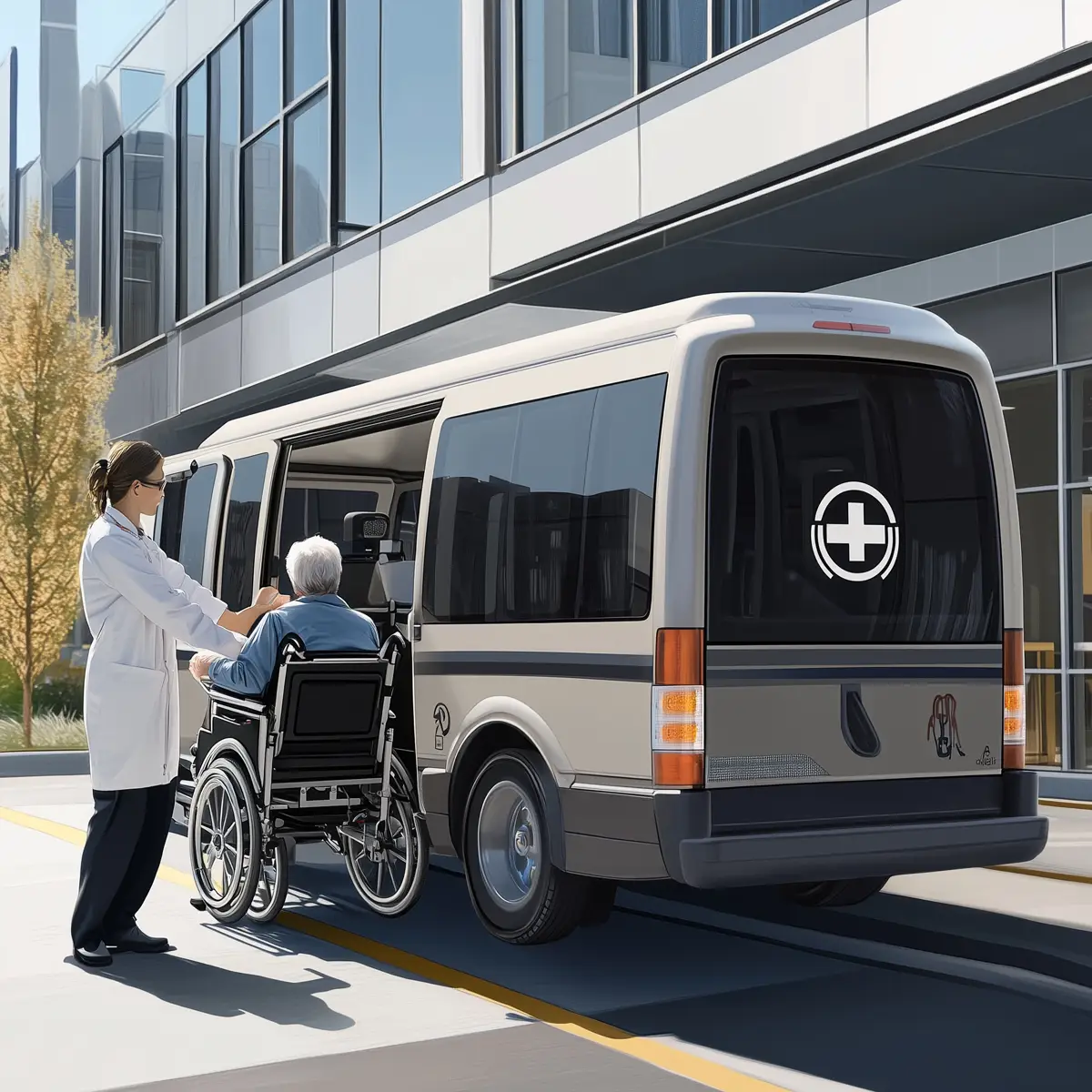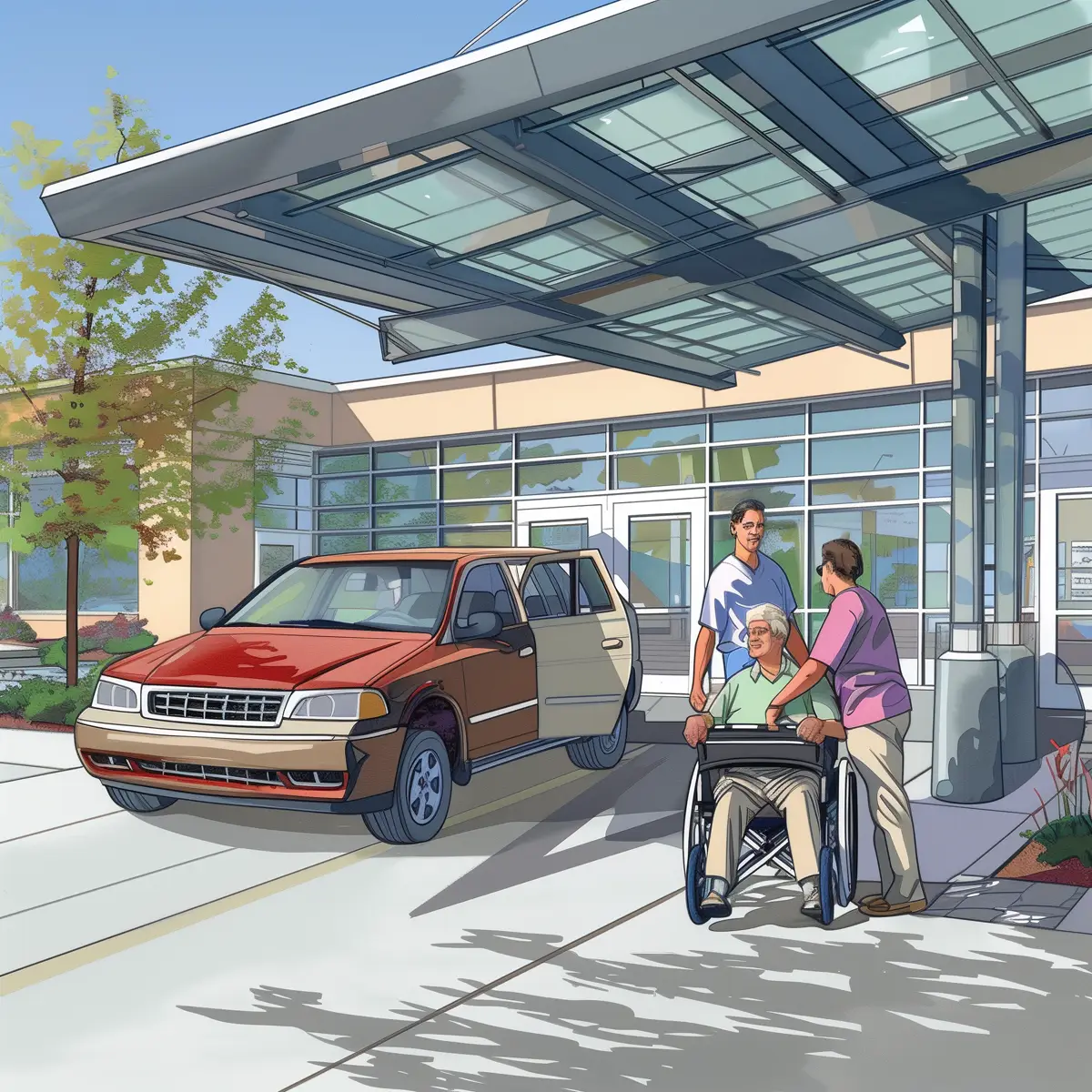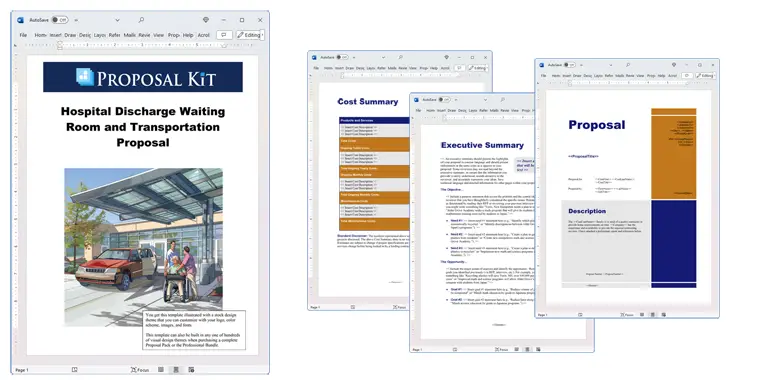How to write your Hospital Discharge Waiting Room and Transportation Proposal
We include this 20 page layout with every Proposal Pack. If you want this template to have a different visual design theme than the one illustrated here, purchase any Proposal Pack design and create this template using the purchased design theme. This template is included in every Proposal Pack. If you get a Proposal Pack or the Professional, you can also make any variation of this template with different chapters to suit your needs.
We typically include more chapters in the templates than most people will need to give everyone more variety in the chapters they may need. You can trim down a long template by removing pages you do not need or combining multiple chapter topics into one page.
 DOWNLOADABLE, ONE-TIME COST, NO SUBSCRIPTION FEES
DOWNLOADABLE, ONE-TIME COST, NO SUBSCRIPTION FEESYou can also create countless variations of this document to suit your needs using the included library of 2200+ chapters if ordering a Proposal Pack or Professional.
 What Our Clients Say
What Our Clients SayThanks for the great service your company has provided. I had a very important sales proposal to prepare for a realty firm, and was given only a 1-day notice. I purchased and downloaded the sales proposal [Proposal Pack] with the Real Estate design, and it was exactly what I needed. The forms were perfect, and the presentation went great. We were told it was the best she had ever seen. Thanks for a great product, and for providing it in a pinch!"
Managing Director/President
Breakwater Mortgage Corp.
Related Article
Related Video
Related Templates
- Medical Transportation Services Proposal
- Home Healthcare Services Proposal
- Healthcare Staffing Proposal
- Elderly Care Services Proposal
- Transportation Logistics Project Proposal
- Limousine Transportation Services Proposal
- Healthcare Outsourced Services Provider Proposal
- Non-profit Community Healthcare Program Proposal
What's the best way to write your hospital discharge waiting room and transportation proposal?
The key to creating an effective hospital discharge waiting room and transportation proposal is using the Proposal Kit template and software package. This system offers various customizable templates and integrates a sophisticated line item quoting database for detailed cost summaries, quotes, estimates, budgets, and other financial documents. Are you in the process of writing such a proposal or facing a similar challenge? If so, Proposal Kit can provide the structured support you need.
What Types of Projects Are Hospital Discharge Waiting Room and Transportation Proposals Written For?
Various project types have proposals written for them when considering the development of a hospital discharge waiting room and transportation proposal. Here are some examples:
- Standard Patient Discharge Lounge Construction
- VIP Patient Waiting Area Development
- Post-Operative Care Transportation Services
- Integrated Patient Tracking Systems
- Accessibility Enhancements for Disabled Patients
- Child-Friendly Discharge Areas
- Elderly Care Transport Solutions
- Multi-Lingual Support Services
- Mobile App for Patient Updates and Transport Requests
- Emergency Quick Response Teams
- Patient Feedback Systems Integration
- Healthcare Staff Training Programs
- Patient Privacy Compliance Measures
- Sustainable Building Practices for New Constructions
- Advanced Booking Systems for Family Pick-ups
- In-Hospital Navigation Systems
- Partnerships with Local Transport Companies
- Real-Time Transport Coordination Centers
- Post-Hospital Care Coordination
- Cultural Sensitivity Training for Staff
Chapters this template is built with
Creating a comprehensive hospital discharge waiting room and transportation proposal requires various chapters to outline every aspect.
While no single template fits every need, Proposal Kit's software allows users to tailor proposals using an extensive library of chapter templates.
By expanding on these chapters, you ensure that your hospital discharge waiting room and transportation proposal is thorough, well-documented, and tailored to meet the specific needs of your project. Proposal Kit's extensive template library allows for customization, making your proposal professional and compelling.
Below are some chapters to consider, each crucial for addressing specific aspects of your proposal.
Cover Letter
Introduce your proposal with a personalized touch, explaining your project's intent and why your organization is best suited for the job. This chapter briefly outlines the purpose and importance of the proposed discharge waiting room and transportation service. Highlight your organization's experience and expertise in managing similar projects to establish credibility from the outset.
Executive Summary
Summarize the key points of your project, emphasizing the impact and benefits of the proposed waiting room and transportation facilities. This chapter should provide a concise yet comprehensive project overview, including the goals, target beneficiaries, and expected outcomes. The executive summary sets the stage for the entire proposal, making it essential to capture the reader's attention and interest.
Cost Summary
Use Proposal Kit's line item database to provide detailed financials, including estimates and budgets. This chapter breaks down the costs associated with the project, including construction, labor, materials, and transportation logistics. Provide precise, itemized estimates to ensure transparency and build trust with the proposal's reviewers.
Needs Assessment
Detail your proposal's specific needs, using data and insights to justify the project. This section should include an analysis of current patient discharge and transportation challenges supported by statistics and research. Explain how the proposed solution will address these issues, improving patient flow and overall hospital efficiency.
Benefits
Highlight your project's advantages to the hospital, patients, and staff. This chapter discusses the tangible and intangible benefits of the proposed waiting room and transportation services, such as improved patient satisfaction, reduced congestion in hospital corridors, and enhanced operational efficiency. Provide real-life situations to illustrate these benefits.
Accessibility
Discuss how your design ensures accessibility for all patients, complying with legal standards. Ensure that the proposed facilities are inclusive and cater to the needs of patients with disabilities. Mention compliance with the Americans with Disabilities Act (ADA) or other relevant regulations, and include specific design elements like ramps, wide doorways, and accessible restrooms.
Implementation Plan
Outline the steps and timeline for the project's realization, ensuring clarity and organization. This chapter should provide a detailed roadmap of the project phases, including planning, construction, and launch. Include milestones, deadlines, and responsible parties for each phase to demonstrate a well-thought-out execution strategy.
Transportation
Describe the transportation logistics and how they will be managed and optimized. Detail the types of transport services that will be provided (e.g., shuttle buses, ambulances) and how they will be coordinated. Discuss scheduling, routes, and partnerships with local transport providers to ensure efficient patient transfers.
Dispatching
Explain the dispatch system for patient transport, including any technological solutions. This chapter should describe how the dispatch system will operate, including any software or technology used to manage and track patient transports. Highlight features like real-time tracking, automated scheduling, and communication systems between dispatchers and transport staff.
Service Area
Define the geographic area covered by the transportation services. Clearly outline the boundaries within which the patient transport services will operate. Mention any special considerations for rural or hard-to-reach areas and how these will be addressed to ensure comprehensive coverage.
Building Codes
Ensure your construction plans comply with all relevant building codes and regulations. This section should detail how the construction of the discharge waiting room will adhere to local, state, and federal building codes. Include references to specific regulations and standards to demonstrate thorough planning and compliance.
Construction
Detail the construction phases, materials, and technologies used in building the discharge waiting room. Provide a step-by-step breakdown of the construction process, including timelines for each phase. Mention any innovative building materials or technologies that will be used to enhance the project's efficiency and sustainability.
Special Needs
Address how the needs of patients with specific requirements will be met. This chapter should focus on how the proposed facilities will cater to patients with special medical, dietary, or mobility needs. Include details on specialized equipment, staff training, and protocols to address these needs adequately.
Budget
Provide a detailed budget, justified with the cost summary and financial forecasts. Present a comprehensive budget covering all project aspects, from initial planning to ongoing maintenance. Justify each expense with data and projections to provide a clear financial picture.
Recommendations
Offer well-reasoned suggestions for the project's implementation and future operations. Based on your needs assessment and project plan, provide recommendations for best practices in implementing and managing the new facilities. These could include staffing guidelines, operational procedures, and strategies for continuous improvement.
Facilities
Describe the physical and technological facilities included in the waiting room. Provide a detailed overview of the waiting room's amenities, including seating, entertainment options, and medical facilities. Highlight any technological integrations like digital check-in kiosks or patient monitoring systems.
Contractors
List potential contractors and justify their selection based on expertise and experience. Detail the contractors you plan to use for the project, emphasizing their qualifications, experience, and reputation. Provide examples of similar projects they have completed to build confidence in your choices.
Use cases for this template
Transforming Patient Discharge with Strategic Planning
Elena, a project manager at Health Innovate Inc., faced the challenge of improving patient discharge procedures to reduce congestion and enhance patient satisfaction. The existing discharge process was causing delays and discomfort for patients and inefficiencies for staff. Elena needed a detailed and compelling proposal to secure funding and support from the administration.
She created a comprehensive hospital discharge waiting room and transportation proposal using the Proposal Kit. The software's extensive library of templates allowed her to cover every aspect of the project, from constructing a new discharge waiting room to integrating a patient transport logistics system. Elena used the Cost Summary template to provide a clear and detailed budget, making a solid case for the project's financial feasibility.
The Needs Assessment and Benefits chapters highlighted the critical issues and potential improvements, while the Implementation Plan laid out a step-by-step strategy for rolling out the new systems. By leveraging the Proposal Kit, Elena secured the necessary funding and gained the administration's full support for the project, leading to a successful overhaul of the discharge procedures.
Meeting Tight Deadlines with Technology
Tom, an operations manager at Rapid Solutions Healthcare, was suddenly tasked with creating a comprehensive hospital discharge waiting room and transportation proposal with a very tight deadline. The project's urgency left little time for extensive research and drafting from scratch. Tom needed a quick yet effective solution to meet the impending deadline.
He turned to Proposal Kit's templates, which provided a structured starting point for his proposal. Tom employed an AI writing tool to help generate content to expedite the process further. By prompting the AI to analyze Rapid Solutions Healthcare's website and existing documents, he was able to gather relevant information quickly. The AI tool assisted in drafting sections such as the Executive Summary, Benefits, and Accessibility.
Tom used Proposal Kit's Cost Summary and Budget templates to present a clear financial picture, while the Implementation Plan and Transportation chapters detailed the logistics of the proposed system. The combination of Proposal Kit's comprehensive templates and AI-generated content enabled Tom to meet his deadline with a professional and thorough proposal. His quick turnaround impressed the administration, resulting in approval for the project.
Non-Profit RFP Writing for Enhanced Patient Care
Maya, the director of CareForAll Non-Profit, needed to write a Request for Proposal (RFP) to invite bids for a new patient discharge system. The non-profit aimed to enhance patient care by improving discharge processes and transportation arrangements. Maya required a structured and clear RFP to ensure all potential contractors could understand and respond appropriately.
Maya used the Proposal Kit to draft an RFP that covered all necessary aspects. She began with the Cover Letter to introduce the project and followed with the Executive Summary to provide an overview. The Needs Assessment chapter identified the specific requirements and challenges faced by CareForAll Non-Profit, while the Benefits chapter outlined the expected improvements in patient care.
The RFP included detailed sections on Accessibility, Implementation Plan, and Special Needs to ensure that all patient demographics were considered. Maya also used the Transportation and Dispatching chapters to specify the logistics of patient transport and the Building Codes and Construction chapters to outline compliance with relevant standards.
By using the Proposal Kit, Maya was able to create a comprehensive and professional RFP. This attracted high-quality bids from reputable contractors, ultimately allowing CareForAll Non-Profit to implement a new discharge system that significantly improved patient care and operational efficiency.
Conclusions and Recommendations
Proposal Kit templates and software provide a comprehensive solution that simplifies the proposal writing process, from understanding the types of projects to detailed use cases. Whether creating detailed cost estimates or managing tight deadlines, Proposal Kit equips you with the tools to succeed.
Also Known As
This template may also be referred to in different ways or be used in more specialized situations, such as:
- Hospital Exit Lounge and Transport Plan
- Patient Discharge Facility and Shuttle Service Proposal
- Medical Clearance Area and Transportation Strategy
- Hospital Release Room and Patient Transport Proposal
- Patient Checkout Lounge and Travel Arrangement Plan
- Medical Discharge Area and Transport Coordination Proposal
- Health Facility Exit Strategy and Transportation Service
- Hospital Departure Lounge Setup and Transport Plan
- Patient Release Facility and Transportation Arrangement
- Care Discharge Lounge and Patient Shuttle Proposal
Abstract
 Creating a hospital discharge waiting room and transportation proposal involves planning to enhance patient throughput and improve the efficiency of healthcare facilities. The process requires collaboration between physicians, nurses, and case managers to ensure that discharged patients receive appropriate care and transportation. By implementing a discharge hospitality center (DHC), hospitals can manage patient flow, alleviate congestion in emergency departments, and reduce the incidence of readmissions. The success of a DHC location relies on clear patient criteria, inclusion and exclusion criteria for its services, and robust support from nursing practice.
Creating a hospital discharge waiting room and transportation proposal involves planning to enhance patient throughput and improve the efficiency of healthcare facilities. The process requires collaboration between physicians, nurses, and case managers to ensure that discharged patients receive appropriate care and transportation. By implementing a discharge hospitality center (DHC), hospitals can manage patient flow, alleviate congestion in emergency departments, and reduce the incidence of readmissions. The success of a DHC location relies on clear patient criteria, inclusion and exclusion criteria for its services, and robust support from nursing practice.
Improvement opportunities lie in overcoming barriers through continued communication between nursing staff, charge nurses, and family members to facilitate a smooth transition from the hospital stay to a ride home. Access to public transportation and partnerships with local transport vendors are important factors in ensuring patients reach their destinations safely and promptly. Detailed discharge orders, aligned with pharmacy distribution and case managers' insights, help assess and evaluate patient needs for a seamless discharge process.
Efforts to enhance patient care culture include educating healthcare staff about the importance of patient throughput and the right place for each patient, preventing unnecessary admissions and boarding. Moreover, using advanced technology for real-time transport coordination, mobile apps for patient updates, and emergency quick response teams can revolutionize the transport logistics system. By fostering buy-in from hospital administration and staff, hospitals can develop and measure effective discharge solutions that account for all potential improvement opportunities.
 Ultimately, a well-structured proposal considers all variables, including financial implications, regulatory compliance, and the need for specialized transport options for diverse patient demographics. Through planning and a commitment to enhancing operational efficiency, healthcare facilities can provide optimal discharge and transportation solutions that benefit patients and staff alike.
Ultimately, a well-structured proposal considers all variables, including financial implications, regulatory compliance, and the need for specialized transport options for diverse patient demographics. Through planning and a commitment to enhancing operational efficiency, healthcare facilities can provide optimal discharge and transportation solutions that benefit patients and staff alike.
In creating a hospital discharge waiting room and transportation proposal, the use of Proposal Kit offers invaluable support by providing structured templates and tools necessary to create comprehensive documents. This system aids project managers in organizing and presenting their ideas, ensuring all critical topics are covered, from cost breakdowns to implementation timelines. By using Proposal Kit, healthcare facilities can establish a successful DHC that addresses patient needs and enhances overall service quality.
A chosen DHC location can significantly decrease patient admission delays and reduce the number of readmitted patients by providing timely and appropriate care transitions. To overcome barriers, it is crucial to foster buy-in from nursing staff, ensuring they are fully aware of the project's goals and benefits. Through continued efforts and open discussion, healthcare providers can educate their teams about the advantages of an efficient discharge process, enhancing their knowledge and ability to manage patient flow.
 By focusing on factors such as access to necessary resources and the timely availability of beds, hospitals can decrease the time patients spend in care units. This focus allows for better resource allocation and improved patient throughput. Additionally, by measuring the impact of these initiatives over weeks and hours, healthcare leaders can assess their effectiveness and make data-driven decisions to optimize procedures.
By focusing on factors such as access to necessary resources and the timely availability of beds, hospitals can decrease the time patients spend in care units. This focus allows for better resource allocation and improved patient throughput. Additionally, by measuring the impact of these initiatives over weeks and hours, healthcare leaders can assess their effectiveness and make data-driven decisions to optimize procedures.
Ultimately, the goal of these proposals is to create a streamlined discharge process that minimizes patient wait times, reduces congestion, and improves patient and staff satisfaction. Through planning and the implementation of a well-designed DHC, hospitals can achieve a more efficient discharge system that positively impacts patients' post-hospital experiences and ensures they receive the best possible care upon leaving the hospital.
To further enhance the effectiveness of a hospital discharge waiting room and transportation proposal, it is important to focus on the planning and implementation of a successful DHC. A well-chosen DHC location can facilitate smoother transitions from hospital to home, providing a centralized area where discharged patients can wait comfortably and securely for their transportation. This location must be easily accessible to both patients and staff, ensuring that all necessary services can occur efficiently and without delay.
 Incorporating insights from Nurse Executive Board-Certified professionals and gaining their buy-in can significantly bolster the proposal's success. By involving these key stakeholders in the planning process, hospitals ensure that the nursing staff's expertise and experience inform the development of the DHC. Their support and input can help tailor the DHC to meet specific patient needs while ensuring that nursing practices align with the overall goals of enhancing patient care and throughput.
Incorporating insights from Nurse Executive Board-Certified professionals and gaining their buy-in can significantly bolster the proposal's success. By involving these key stakeholders in the planning process, hospitals ensure that the nursing staff's expertise and experience inform the development of the DHC. Their support and input can help tailor the DHC to meet specific patient needs while ensuring that nursing practices align with the overall goals of enhancing patient care and throughput.
The impact of these efforts can be measured through various metrics, such as reduced wait times, improved patient satisfaction scores, and decreased readmission rates. By closely monitoring these indicators, hospitals can adjust their strategies as needed to optimize the DHC's operations. Additionally, involving staff in regular feedback sessions helps identify areas for improvement and ensures that the DHC evolves to meet changing patient and hospital needs.
Ultimately, a well-executed DHC not only improves patient experiences but also enhances the hospital's operational efficiency. By providing a structured and supportive environment for discharged patients, hospitals can ensure that each patient's journey from admission to discharge is as smooth and stress-free as possible.
Frequently Asked Questions
What are the first steps in writing a hospital discharge waiting room and transportation proposal?
The first steps in writing a hospital discharge waiting room and transportation proposal involve conducting a needs assessment and gathering all relevant data. Identify the problems the new waiting room and transportation services will solve, such as easing congestion and improving patient flow. Next, outline your project's objectives and critical components, then use Proposal Kit's templates to begin structuring your proposal. Starting with a well-defined problem and solution will guide the rest of your proposal writing process.
How can I make my proposal stand out to the hospital administration?
To make your proposal stand out, focus on clarity, relevance, and the benefits your project will offer. Use the Executive Summary to highlight the key points briefly, emphasizing how the new waiting room and transportation services will improve patient care and operational efficiency. Include detailed Cost Summaries and Implementation Plans to show thorough preparation and feasibility. Proposal Kit's polished and professional templates will help enhance the overall presentation of your proposal.
What financial details are essential to include in my proposal?
Important financial details include a well-organized cost summary, budget, and detailed financial forecasts. Use Proposal Kit's line item quoting database to provide accurate estimates and breakdowns of costs, covering everything from construction expenses to transportation logistics. Explain how each cost contributes to the project's success and justify the budget allocations. This transparency will build trust with the decision-makers.
How can Proposal Kit help me address regulatory and compliance issues?
Proposal Kit includes templates for addressing Building Codes and Compliance, ensuring that your project meets all relevant health and safety regulations. Detail how your construction plans adhere to these codes and how the transportation services will comply with legal requirements. Using these templates, you can demonstrate that your proposal is innovative and compliant with necessary standards, which is crucial for gaining approval.
What supporting documents should I include in my proposal?
Supporting documents that add value to your proposal include Needs Assessment reports, Benefits analysis, and Recommendations from experts. Also, include detailed Implementation Plans and timelines to show a clear path to project completion. Add any letters of support or endorsements from stakeholders or community leaders if available. Using Proposal Kit's comprehensive library, you can ensure all necessary documents are included and well-organized, enhancing the credibility of your proposal.
20% Off Discount
![]() Add To Cart This Word Template
Add To Cart This Word Template
 Add To Cart Proposal Pack for Any Business
Add To Cart Proposal Pack for Any Business
 Add To Cart Proposal Kit Professional
Add To Cart Proposal Kit Professional
 4.7 stars, based on 849 reviews
4.7 stars, based on 849 reviewsProposal Kit chapters used in this template
Cover Letter, Title Page, Table of Contents, Executive Summary, Needs Assessment, Benefits, Facilities, Accessibility, Special Needs, Service Area, Transportation, Dispatching, Implementation Plan, Building Codes, Contractors, Construction, Cost Summary, Budget, Recommendations, Back Page
Line Item Automated Chapters
If you purchase a Proposal Pack or the Professional Bundle, these proposal pages are generated using an automated line-item database in the included Wizard software.
Cost Summary, Implementation Plan, Budget Three Year
You use this proposal for
- General business proposal
- Non-technical proposal
- Project pitch proposal
- Internal company proposal
- Construction, contracting, building proposal
- Medical, healthcare, wellness proposal
How to create this template with Proposal Pack Wizard
You can create this document using any of the logo-designed Proposal Packs. Pick any Proposal Pack with a logo design theme you like best; they will all work equally well. The Proposal Pack for Any Business is the pack with no extra added logos or colors - designed to be used plain or for you to customize with your logos and graphics.
The Proposal Pack design theme you purchase will determine the visual look of this template. The screenshot above only shows the plain generic design theme.
We include a library of chapters to be assembled based on your needs. All proposals are different and have different needs and goals. We designed Proposal Pack so you can customize the documents to suit your needs.
You will best create this document using the Proposal Pack Wizard - Expert Edition software to select this template and build it in the Proposal Pack logo design theme of your choice along with any desired customizations (such as adding additional chapters, removing unneeded chapters, changing the order of chapters, and importing your company logo). This template outlines a proposal for the described situation. Each user is responsible for typing in the actual content of the provided pages with their information to complete the proposal. Suggestions in the abstract may include features in higher-end packages and are facilitated by the selection of chapter templates to support the narrative of each proposal, which help guide the user in filling in the details.
The Wizard software's AI Writer will write the content of the pages of the template based on details provided for your company, client, project, financial details and other writing instructions. This will provide a personalized version of the template completely written and ready to edit.
Once finished, the AI Writer's Word-to-PowerPoint converter can transform your proposal, business plan, or other business documents into a PowerPoint slideshow. Save time and effort by letting the AI analyze every chapter to condense its content into talking points, visually matching the document, and providing a consistent package of presentation material with the click of a button.
You create this template using the Wizard software with an entire Proposal Pack library and software. We include the Expert Edition of the software in the Proposal Kit Professional. Microsoft Word for Windows is required to use the customizing software. You can also edit Word document templates in other office software such as Word for Mac. We will assist Mac users in assembling complex templates for their first project if they do not have the required platform to run the Wizard software.
How to Build Templates Featured on Proposal Kit Website
Many people find the Proposal Kit website after searching for a specific proposal. Once you've purchased and installed the software, how do you build that template you found in the first place? This video shows you how to build any proposal you see on the Proposal Kit website.
 Ian Lauder has been helping businesses write their proposals and contracts for two decades. Ian is the owner and founder of Proposal Kit, one of the original sources of business proposal and contract software products started in 1997.
Ian Lauder has been helping businesses write their proposals and contracts for two decades. Ian is the owner and founder of Proposal Kit, one of the original sources of business proposal and contract software products started in 1997.By Ian Lauder
 Published by Proposal Kit, Inc.
Published by Proposal Kit, Inc.


 Cart
Cart
 Get 20% off ordering today:
Get 20% off ordering today: 


 Facebook
Facebook YouTube
YouTube Bluesky
Bluesky Search Site
Search Site